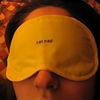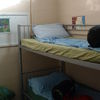Hostel Dreamland - keys to a good night's sleep
Kat Lapelosa
After a long day trekking around your city of choice, you're going to want to sleep. If you have the enviable ability to fall asleep instantly anywhere, read no further. But if you are a light sleeper, a tosser-turner or an insomniac, try out some of these tricks - you'll become a narco in no time.
I always make sure I have two things with me when sleeping in a hostel. The first, is an eye mask. This is especially important when sharing a room with several people. Most hostels to not employ lock out times, so people will be coming in and out. They may need to turn on the light to get ready for bed - or they may be drunk and forget to turn it off completely. To avoid suffocation from covering your head with a pillow, or the discomfort of improvised clothing masks, pack an eye mask. They take up minimal space and will provide you with just the right amount of darkness.
Earplugs are another piece of essential nighttime gear. I prefer foam inserts to silicon disks because they tend to fit inside your ear more securely. These miniscule items are wonderful for preventing those loud, repetitious gargling noises otherwise known as snoring. Believe me, there is a snorer in every dorm room. And like the lighting situation, your roommates may be noisy when readying themselves for sleep. Prevent grumpy glares at them over breakfast with a pair of earplugs. Bring extras, just in case.
BAKPAK TIP: Some international airlines provide complimentary eye masks and earplugs on long-haul flights. If yours does, score!
If you are a modest person, be prepared to see all kinds of sleep fashion on display when sharing a dorm. No one will be fully nude (if they are, I give you permission to call them out) but "pajamas" is a very subjective term. Packing a pair of shorts or light-weight pants and a T-shirt will ensure no one is offended by your choice of nighttime attire, and you will be comfortable too.
If you have trouble falling asleep in an unfamiliar bed, or one that it is uncomfortable, brew up a cup of Chamomile tea or warm milk in your hostel's kitchen - this will help you get feel calm and possibly drowsy. Lavender scented items are also said to lull weary travelers to sleep. And some people take Melatonin, a dietary supplement that acts as a natural slumber pill. Discuss usage with your doctor, however; in some cases, Melatonin causes crazy dreams - you don't want to freak out your dorm mates.
Are you picky about the bedding in hostels, you know, the pillows that are flat as a pancake, and sheets, that double as blankets? If you have certain comfort needs, provide them yourself. And check to make sure your hostel includes beddings, you might have to pay a bit more. You can pack an extra sheet or pillow, which also serve as handy items for an impromptu picnic, costume party or makeshift beach attire. But do not bring a sleeping bag - most, if not all, hostels do not allow them on the premises because they may carry bed bugs.
If there is something wrong with your sleeping arrangements, contact the staff - don't wait until morning. Unlike hotels, you won't likely be transfered to a new room, but the staff will help you as best they can. Use the security locker (provided by most hostels) to keep your stuff safe while you catch some Z's. Ensure yourself a good night's sleep by following these tips and you'll quit tossing and turning and save your energy for the real world, not Dreamland.
Featured Articles
Well this the real world and sometimes you want to get it on with your mate-of-the-moment in imperfect circumstances, like when your only retreat is a somewhat-smelly hostel room with six bunk beds and a drunk girl passed out in the corner.
Backpackers are presented with a large variety of lodging options. You can stay in a cheap hotel, cute inn, bed and breakfast, campground, room for rent, guesthouse, luxury resort, or hostel.
With the birth of third-party hostel booking engines came the booking or reservation fee (on top of the 10% deposit for your entire stay). Prior to this, you may have booked hostels without paying a fee through student travel agenices but they generally marked up the cost...MORE
As a traveler, you'll need to catch some shut eye eventually. For a everyday adventurer on a budget, I recommend staying in a hostel. What is a hostel you ask?
Body wash in one hand, loofah in the other, I pushed forward on the door to my hostel's bathroom only to be hit by an odorous wall of mildew that had me jumping back into the hallway.
Free Backpacking Europe Planning & Essentials Guide
Download/More info on the Backpacking Planning and Essentials Guide
Featured Articles
Well this the real world and sometimes you want to get it on with your mate-of-the-moment in imperfect circumstances, like when your only retreat is a somewhat-smelly hostel room with six bunk beds and a drunk girl passed out in the corner.
Backpackers are presented with a large variety of lodging options. You can stay in a cheap hotel, cute inn, bed and breakfast, campground, room for rent, guesthouse, luxury resort, or hostel.
With the birth of third-party hostel booking engines came the booking or reservation fee (on top of the 10% deposit for your entire stay). Prior to this, you may have booked hostels without paying a fee through student travel agenices but they generally marked up the cost...MORE
As a traveler, you'll need to catch some shut eye eventually. For a everyday adventurer on a budget, I recommend staying in a hostel. What is a hostel you ask?
Body wash in one hand, loofah in the other, I pushed forward on the door to my hostel's bathroom only to be hit by an odorous wall of mildew that had me jumping back into the hallway.
Free Backpacking Europe Planning & Essentials Guide
Download/More info on the Backpacking Planning and Essentials Guide




